To harness power, one must first acknowledge power. To some people, the ubiquitous cell phone is still 'just' a phone.
To others, it is so much more. It is the world in the palm of their hand - literally.
But challenges lie ahead. As cell phones have become an integral part of people's lives, the quality of their lives is changing. Sometimes for better; sometimes for worse. Sometimes without even realizing it.
Some believe that the same technology that has liberated our world might also imprison us if we don't seriously examine its effects on us personally and collectively.
The impact of cell phone use is more than a passing phenomenon and something worthy of legitimate academic study. That is what Florie Brizel believes.
Florie has a diversified background in visual and verbal communications. For the past six years, she has immersed herself in learning and writing about the mobile phone industry.
She is currently working on her third book, which examines what she calls Mobilology - the study of the effects of mobile phone use on behavior, community, culture, entertainment, and economics.
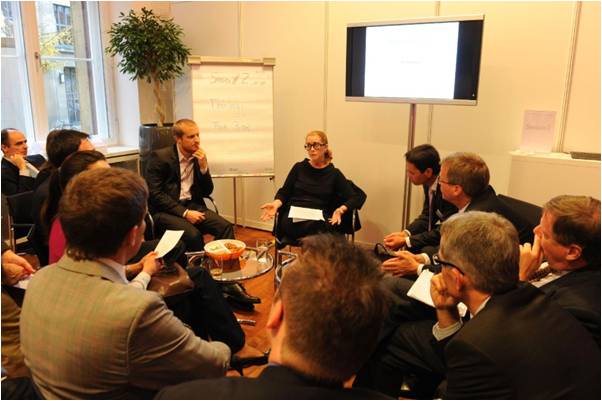 Florie Brizel led a break-out group discussion on Mobilology at the 2009 Deutsche Telekom Innovation Day Conference in Berlin. Photo courtesy of Deutsche Telekom.
Florie Brizel led a break-out group discussion on Mobilology at the 2009 Deutsche Telekom Innovation Day Conference in Berlin. Photo courtesy of Deutsche Telekom.
I had the fortune to speak with her recently in Barcelona, at the 2010 Mobile World Congress.
This cell phone trade show, with 50,000 participants, is known as the place for visionary keynotes and action-provoking panel discussions, exhibitions of more than 1,300 companies displaying the cutting-edge products and technology that will define the mobile future, and the planet's best venue for mobile industry networking, finding business opportunities -- and making deals.
Florie was able to ignore this cellular circus for a few minutes and explain to me the social side of mobile telephony:
Mobile phones allow people to talk to the world, but they can do so much more. We must teach people how to really maximize the global linkage available to them through their mobile devices, especially if we expect them to be used for any kind of social good.
Of course, technology and humanity are not necessarily compatible. One is about an anonymous push forward into the unknown... to explore it, to develop and exploit it, which is important.
The other is about paying undivided attention to the individual and the world in front of you, developing relationships, and increasing consciousness.
Both are necessary. The challenge is figuring out how to use technology to enhance humanity, not degrade it.
Florie, who interacts regularly with leaders of Fortune 500 companies such as Deutsche Telekom, told me she is working to connect members of the global mobile community with academics around the world to facilitate unexpected intellectual collaboration for the purpose of inspired innovation.
To make this happen, she has begun talks with the GSM Association, which represents the interests of the worldwide mobile communications industry. Florie explained:
I am promoting Mobilology as a new and bona fide academic field of study which focuses on the social science aspect of mobile phones, not their technology.
I have been in discussions with the University of Southern California for a few years trying to make this happen, and I was recently approached to lecture and teach at two different international schools of economics later this year.
Mobilology addresses how mobile phone use affects life in the modern world. Not only does it address the five main sectors of behavior, community, culture, entertainment, and economics, but it also will encompass mHealth, mBanking, mEducation -- and whatever else comes along.
It's the first academic discipline that is inherently collaborative as well as being interdependent with other academic disciplines: you can't address one aspect of mobile, say, economics, without taking into consideration at least one, if not two, of the other aspects -- such as people's behavior and even culture.If you want to know how mobile phones effect entertainment, you need to examine the behavior of the people watching and/or purchasing entertainment content, and that leads you to consider economic impact as well.
American Idol is a great example. How do people vote for their favorite performer? By sending an SMS text through their mobile phones.
They're willing to pay money for this. It's fun, so they encourage their friends to participate with them. And it's easy, allowing young and old viewers alike to engage. American Idol has become a cultural phenomenon as a result.
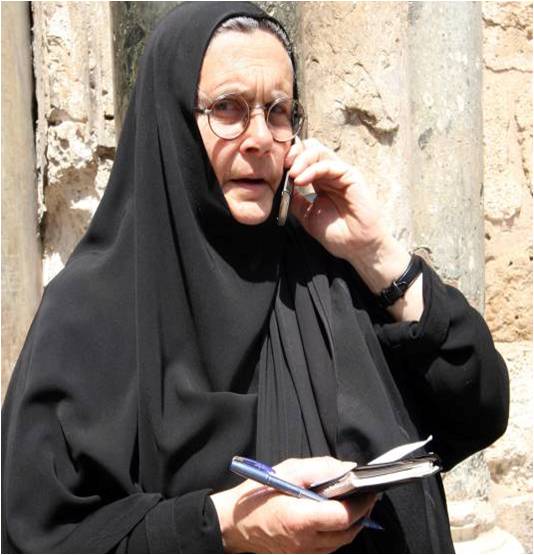
Cell phones today are used by all people in all cultures all over the world. Photo courtesy of IsraelSun.com.
Florie continued to explain to me her ideas:
In terms of culture, I want to explore how mobile can bring people together to learn about each other. But I'm also interested in how it can potentially 'flatten' the very flavors that make each culture unique.
This is especially true for cultures that have managed to avoid significant interaction with the outside world, and particularly, avoid influence from the Western world.
Take "Grand Theft Auto IV" - an example of wildly successful digital entertainment, even if it's not for mobile phones - is something like this really the first impression of the U.S. that a village youngster from Africa should have?" (For the record, this writer's 16-year old son is forbidden to play it!)
To better understand how the Millennial Generation uses technology to connect life and work, Florie recently completed a six-week residency in Berlin, observing 30 exceptional thinkers under the age of 30 from around the world who participated in the Palomar5 technology innovation incubator.
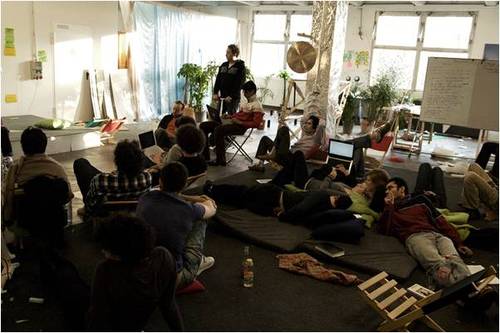
Palomar5 residents of the Millennial Generation watch a timed project presentation in Berlin. Credit: Photo by Laurent Hoffmann.
Young entrepreneurs are interested in finding the best resources available to achieve their goals, and they employ mobile social networking to do this. I mentor several of them around the world, staying in touch through a variety of mobile technologies. Thank heaven for Skype - like Google, it's becoming a verb as well as a noun!
The under-30 crowd uses digital technology without a second thought. What's impressive is that when challenged to innovate at Palomar5, the residents didn't make technology the "star." They used mobile and wireless technology as tools to help them create and prototype numerous socially-oriented endeavors.
Many of the residents I met there are already well on their way to success using mobile and wireless technologies. I think these two examples illustrate the direction of the future:
Apurv Mishra, a 19-year old TED Fellow, world-renowned inventor, and entrepreneur from India currently is working on a future prediction system (business/product) based on a unique algorithm.
He also wants to improve development in underserved regions in India through education, networking for entrepreneurs, and even using mobile technologies to invent assistive prosthetic devices for people with physical disabilities.
Kosta Grammatis has spearheaded a global initiative to make access to information a human right. Why should someone be held back intellectually or economically simply because he or she cannot access well-known information that is already publicly available?
With initial funding from Deutsche Telekom, and a board of advisors including Noah Samara (founder of XM Radio and World Space), Kosta (and many others) are working to make Internet access available to everyone around the world - free of cost! Naturally, everything Internet will eventually be accessible by mobile. You can learn more about this here.
"Umbilical cords are the lifeline between infants and their mothers," Florie said. "Power cords became the new umbilical cords, keeping us connected to our computers. Mobile technologies dispense with cords altogether.
"It's only a matter of time before cell phones go solar, batteries die out, and power cords will be history. It is this untethered freedom and how we assimilate mobile phones into our daily existence that fascinates me. I want to be a part of the 'new' world developing before our very eyes."
 A Hasidic Jew in Jerusalem stays connected via Mobile technology.Photo courtesy of IsraelSun.com.
A Hasidic Jew in Jerusalem stays connected via Mobile technology.Photo courtesy of IsraelSun.com.
The buzz words floating around Barcelona are harder for me to comprehend then Castilian Spanish. Neither language is familiar to this New Yorker, who can at least follow his Colombian and Mexican friends. I asked Florie to translate for me.
"The buzz words can make you dizzy from their repetition. This year it's App! App! App! The great thing is that with mobile, everything is possible. We already see what is happening in Iran, China, Pakistan and elsewhere when the populace has access to mobile communication... the truth can be told in real time.
The outside world can witness violence as it's happening, or observe political suppression, or human oppression, and because of mobile phones, there's a chance of developing a collective conscience. Through world outcry, we can impact positively for the eradication of such horrors.
'Transparency' is the new watchword of today's upcoming generation. When you block it, there's a predisposition to believe something bad must be happening. While this isn't always so, there is a modicum of truth with regard to government that blocks open communication.
"Ask the Chinese. Or Iranians. When a government goes to the extent of blocking mobile communication, it is easy to deduce that such open communication presents a threat to their aims," she said.
In a sense, mobile communication has created a form of "Big Brother," which usually has a negative connotation. However, the ubiquitous documentation and instantaneous reportage afforded by mobiles -- through their cameras or by using Twitter -- have a very different feel than Government Big Brother watching our every move, as in London, with its video cameras everywhere.
I think the difference is that we generally consider mobile phones to be benevolent, rather than malevolent, because we believe we can control who we watch, when, where, etc. But we can't.
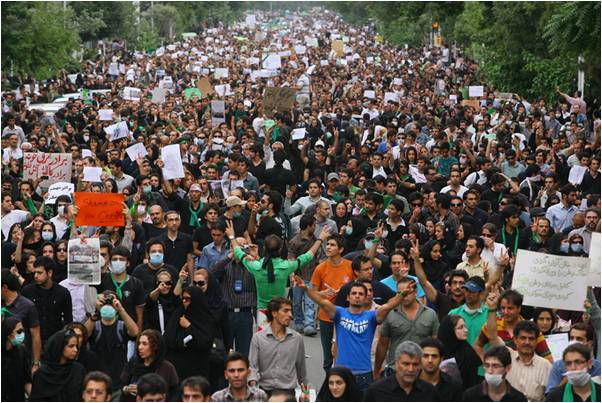 Political uprisings anywhere in the world today depend on cellular technology.
Political uprisings anywhere in the world today depend on cellular technology.
Mobiles give us power and, yet, strip us of it at the same time.
One need only look at the distress caused to individuals, families, and even governments by the appearance of embarrassing candid videos published anonymously on YouTube or elsewhere.
To understand the behavioral impact these 'handies,' as Germans call them, have on our lives today, just think about the sheer panic that ensues when a mobile phone is lost or stolen.
Mobile phones are profoundly changing life as we previously knew it. From keeping in touch with youngsters to using GPS to literally find them, from playing a game to pass the time to using augmented reality as part of a game for learning, mobile phones can and, soon, must be able to do it all.
Eric Schmidt, CEO of Google, summed up the overall impact of mobile phones on modern life in one sentence in his keynote address here in Barcelona: "It's now the joint project of all of us [in the mobile industry] to make mobile be the answer to pretty much everything."
I asked Florie how all of this cell phone technology can move humanity forward, with peacekeeping, for example.
"Peace building can come if and when people use their mobile devices to find other like-minded people with similar goals to unite, not divide. To help, not hurt. Mobile phones will hopefully help us see that no matter where we live, no matter our language, skin color, age, or health, we are all human beings. We are all connected;
"Peace comes when people have adequate food, shelter, economic and physical security, and education for a better future," she added.
Mobile phones helped save lives in Haiti after the recent earthquake, not only by identifying where survivors were amidst the rubble, but also by providing an easy and ongoing means by which the rest of the world could donate money toward disaster relief. In Haiti, I doubt landlines will be restored after this recent earthquake. Cellular towers will take their place.
Mobile phones contribute to economic development by allowing us access to previously inaccessible geographic frontiers... and then to communicate globally from there. In many parts of Brazil, Russia, India, China, and Africa, for example, wireless mobile communication has leapfrogged over landline infrastructure.
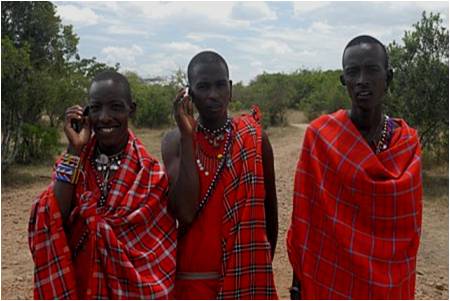 Maasai tribesmen today in Kenya rely on their cell phone technology.
Maasai tribesmen today in Kenya rely on their cell phone technology.
Bringing mobile communication to remote locations is making a tremendous and positive impact on agricultural development, on distribution of funding for aid and refugee programs, and on and on.
mHealth will allow healing where there existed only pain and suffering. mBanking may potentially have a negative impact on the traditional barter system, but it will allow people who previously couldn't trade equitably to now enter into business relationships.
People who do business together have a mutually vested interest in each other's well being. This is the beginning of community, and communities typically work for the common good.
I seemed to have gone to the right expert for an overview on how cell phone technology impacts our world vis-a-vis psychology, community, culture, entertainment, and economics.
Florie Brizel is not only extraordinarily tuned into the world of mobile telephones, she is a thought leader and global citizen whose voice needs to be heard around the world.
Other Related Stories on Connectivity by Jim Luce:
Roshan: Cell Phone Company Helping to Change Afghanistan (Huffington Post)
C.E.O. Brooke Partridge Helps Lead Technology Thought in Developing World (Huffington Post)
Connecting Disaster Relief Through Technology After Earthquake in Haiti (Huffington Post)
Introduction to mFinance: Cell Phone Banking (Huffington Post)
Goodbye, Western Union? Overseas Remittances Now ATM to ATM (Huffington Post)
